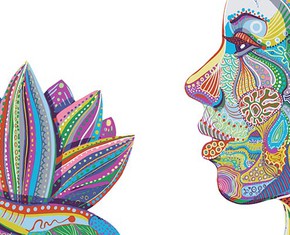The views expressed in our content reflect individual perspectives and do not represent the authoritative views of the Baha'i Faith.
In many places, a growing distrust of the mainstream media has proliferated and spread.
Dissatisfied by what they’re seeing and reading in established media outlets, people seek out new ways of keeping in touch with the world. Certainly that’s what’s happening in my home country, the United States. It might be happening where you are too. You’re the best judge of that. But no matter where you are, the teachings of the Baha’i Faith can illuminate certain questions pertaining to the role and function of the media within a society.
The mass media is not just a means of disseminating information and entertainment. The content that television programs, newspapers, magazines, websites, and other outlets publish or broadcast can be thought of as a virtual table around which the members of a society gather to discuss issues of mutual interest. At its most fundamental level, the media constitutes a set of instruments that culturally and intellectually bring people together, giving them common reference points and a way to search for the truth.

For the sake of unity in a society, the ability of media outlets to genuinely reach the majority of its members can be very important. Otherwise, if the media landscape becomes too fragmented and specialized, people with different worldviews and perspectives may not have the common basis of information that leads to a real conversation. Instead, they’ll just talk past each other, and the divisions of that society will grow deeper and more rigid.
Two core teachings of the Baha’i Faith act as vital remedies for addressing the problems people see with the mainstream media. The first—a consciousness of the oneness of humanity—connects us with other people rather than drive us apart. The second—the independent investigation of reality—can help us all find the truth, the media included.
First, let’s look at a couple of passages from the Baha’i writings:
O ye two blessed souls! Your letters were received. They showed that ye have investigated the truth and have been freed from imitations and superstitions, that ye observe with your own eyes and not with those of others, hearken with your own ears and not with the ears of others, and discover mysteries with the help of your own consciences and not with those of others. For the imitator saith that such a man hath seen, such a man hath heard, and such a conscience hath discovered; in other words he dependeth upon the sight, the hearing and the conscience of others and hath no will of his own.
Now, praise be to God, ye have shown willpower and have turned to the Sun of Truth. – Abdu’l-Baha, Selections from the Writings of Abdu’l-Baha, p. 32.
In another discussion of the same theme, Abdu’l-Baha builds up to the following point:
As reality is one and cannot admit of multiplicity, therefore different opinions must ultimately become fused into one. – Ibid., p. 312.
In this way, Abdu’l-Baha calls on us to show vigor and energy in the pursuit of truth. He deplores the laziness of relying on others to do our thinking for us. This is important both for those who consume media and for those who produce it. Of course, many news sources do not encourage thoughtfulness in the general public, with their screaming talking heads, flashy announcements, scare-mongering tactics and reckless spreading of rumors rather than facts. But quite frankly, the folks reading, watching, or listening at home reward media institutions for this kind of sensationalistic and slanted coverage—if people didn’t respond favorably, the media wouldn’t put it out there in the first place.
To solve this problem, everybody involved needs to engage at a higher intellectual level. We need to be mindful of our own biases, patient about drawing conclusions from partial evidence, diligent about doing our own research, and open to accepting truths that don’t fit our existing opinions. The intellectual requirements of independently investigating reality are too numerous to explore here. But one thing holds true for all of them—to think independently, an enlightened discipline must infuse our inner life. Seeking the truth is a fundamentally spiritual enterprise, and therefore a responsibility that religion and morality must accept as its own.
Also, when we approach our investigations with the consciousness of the oneness of humanity in mind, we come to see other people as fellow seekers in a common pursuit of the truth, rather than foes to be contradicted, or enemies to be ridiculed. If the general public makes sincere efforts to explore reality, then we come to see that we all look for the same reality, and glimmerings of agreement will appear:
In proportion to the acknowledgment of the oneness and solidarity of mankind, fellowship is possible, misunderstandings will be removed and reality become apparent. Then will the light of reality shine forth, and when reality illumines the world, the happiness of humankind will become a verity. – Abdu’l-Baha, The Promulgation of Universal Peace, p. 327.
Reality is not divisible; it does not admit multiplicity. All the holy Manifestations of God have proclaimed and promulgated the same reality. They have summoned mankind to reality itself, and reality is one. – Ibid., p. 96.
Rather than molding and distorting reality to conform to unsound opinions, Abdu’l-Baha exhorts us to make ourselves receptive to the singular and indivisible light of reality. When our opinions are woven through with the thread of reality, we all become connected. Because reality is one, so too can humanity become one. The Baha’i teachings say that two essential methods can get us there: an abiding consciousness of the oneness of humanity and the independent investigation of reality.
















Comments
Sign in or create an account
Continue with Googleor